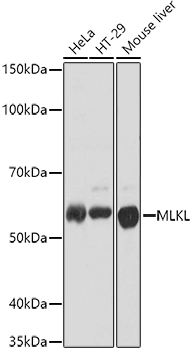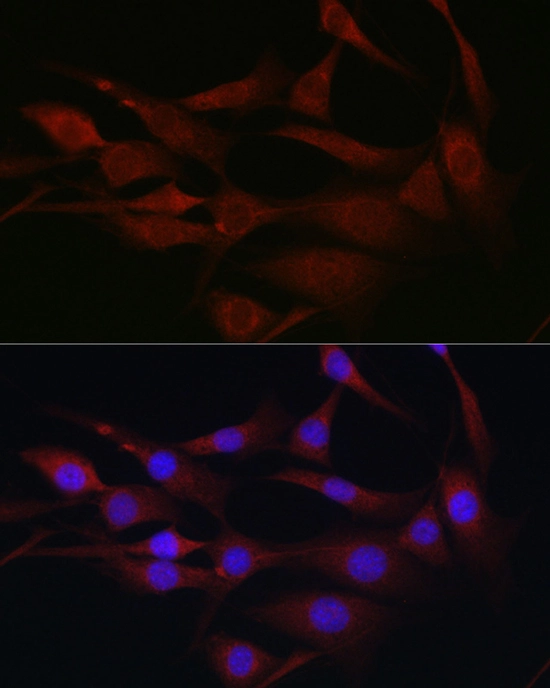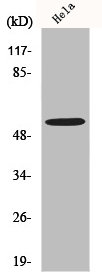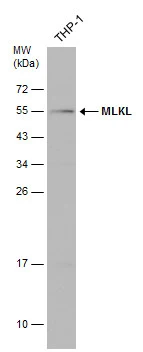
WB analysis of various samples using GTX04591 MLKL antibody. Loading : 25 μg Dilution : 1:1000
MLKL antibody
GTX04591
ApplicationsImmunoFluorescence, Western Blot, ImmunoCytoChemistry
Product group Antibodies
ReactivityHuman, Mouse
TargetMLKL
Overview
- SupplierGeneTex
- Product NameMLKL antibody
- Delivery Days Customer9
- Application Supplier NoteWB: 1:500-1:1000. ICC/IF: 1:50-1:200. *Optimal dilutions/concentrations should be determined by the researcher.Not tested in other applications.
- ApplicationsImmunoFluorescence, Western Blot, ImmunoCytoChemistry
- CertificationResearch Use Only
- ClonalityPolyclonal
- ConjugateUnconjugated
- Gene ID197259
- Target nameMLKL
- Target descriptionmixed lineage kinase domain like pseudokinase
- Target synonymshMLKL, mixed lineage kinase domain-like protein
- HostRabbit
- IsotypeIgG
- Protein IDQ8NB16
- Protein NameMixed lineage kinase domain-like protein
- Scientific DescriptionThis gene belongs to the protein kinase superfamily. The encoded protein contains a protein kinase-like domain; however, is thought to be inactive because it lacks several residues required for activity. This protein plays a critical role in tumor necrosis factor (TNF)-induced necroptosis, a programmed cell death process, via interaction with receptor-interacting protein 3 (RIP3), which is a key signaling molecule in necroptosis pathway. Inhibitor studies and knockdown of this gene inhibited TNF-induced necrosis. High levels of this protein and RIP3 are associated with inflammatory bowel disease in children. Alternatively spliced transcript variants have been described for this gene. [provided by RefSeq, Sep 2015]
- ReactivityHuman, Mouse
- Storage Instruction-20°C or -80°C,2°C to 8°C
- UNSPSC41116161






![IHC-P analysis of human skin tissue using GTX34079 MLKL antibody [8H7]. Dilution : 1:200](https://www.genetex.com/upload/website/prouct_img/normal/GTX34079/GTX34079_20200622_IHC-P_357_w_23060801_241.webp)


![Various whole cell extracts (30 μg) were separated by 12% SDS-PAGE, and the membrane was blotted with MLKL antibody [HL1849] (GTX637574) diluted at 1:1000. The HRP-conjugated anti-rabbit IgG antibody (GTX213110-01) was used to detect the primary antibody.](https://www.genetex.com/upload/website/prouct_img/normal/GTX637574/GTX637574_44872_20221125_WB_22112723_689.webp)
